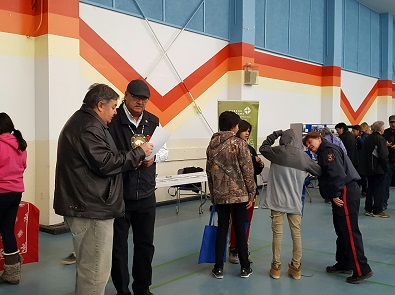MC Eugene Arcand and a residential school support worker at the Indian Residential School Conference. Photo by Chelsea Laskowski
Elders from Prince Albert Grand Council’s communities shed tears Wednesday morning at an Indian Residential School conference.
They’re remembering the damage done through residential schools, but they’re also seeking a way to heal children whose parents or grandparents have been through that system.
Students from Montreal Lake high school and the University of Regina were among those attending the conference in Prince Albert.
Organizer Penny Constant, the associate director of PAGC Health and Social, said it was her intention to target youths with the conference.
The Truth and Reconciliation Commission exposed the past, and Constant said there’s a responsibility to use the knowledge of the past in a healthy way.
Constant said she personally feels the intergenerational effects of Indian Residential Schools, in failing to feel nurtured by her parents growing up and having never learned Cree.
“It’s very difficult for myself not to harbor that anger towards non-First Nations people,” she said.
It’s important to let go of resentment, forgive, and understand that First Nations people are resilient, Constant said.
“Reconciling also means looking at the past and understanding what has happened in our homes and in our communities, and having compassion for that rather than anger and bitterness,” she said.
She and other speakers at the conference are not mincing words about the issues that have become more and more apparent with young girls committing suicide in northern Saskatchewan.
Speaking to the hundred or so people present, Constant said nurturing and parenting is hard for people who grew up with parents who had been stripped from their families to go to residential school.
PAGC Vice-Chief Joseph Tsannie relayed his personal story. He said his parents attended residential school, and both became alcoholics.
Tsannie said his father didn’t pass on all the cultural practices he grew up with, and never talked about residential school.
Now, he said communities need to identify “what are we doing to help parents who are lost” and identify threats to their children.
On a personal level, Constant said she has a gift where troubled girls come to her to talk, and “all they want is somebody to listen. They want parents: they want a mom, they want a dad.”
She said the traditional ways that are missing in many First Nations communities are the key to healing, especially since customs have a way of making children feel special.
